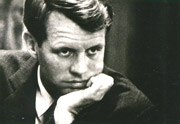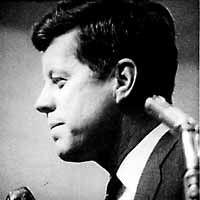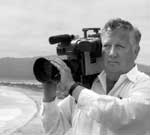 | Direct Film - Robert Drew specialized in the candid still picture essay |
|
Crisis |
Primary - the ferst powerful film about John Kennedy |
Robert Drew - http://www.imdb.com/name/nm0237707/ |
"Good films have to be subjectively made -- the viewer has to be seeing them subjectively. If he''s seeing it objectively, it won''t work as film. So, if the viewer needs a subjective experience, then the filmmaker has to render a subjective experience -- something that''s from the viewpoint of the filmmakerģThe filmmaker''s job is to tell a story, but he doesn''t want to stand off and not be involved or have the camera on a pedestal that doesn''t move. The camera must go with the action or the characters, and to that extent, it''s subjective."
- Robert Drew, http://www.docurama.com/Docurama/filmmakers/drew_robert
Robert Drew began his signature candid filmmaking style, the foundation for the Cinema Verite movement in American cinema, with Primary in 1960. A breakthrough in documentary filmmaking, Primary is the first film in which the sync-sound motion picture camera was utilized to move around freely with its subject - in this case, a young senator John F. Kennedy.
Primary
Robert Drew
60 mins, USA, 1960, 16mm
In 1960 filmmaker Robert Drew followed a young charismatic Senator John F. Kennedy on his campaign trail in the lead up to the Wisconsin Democratic Primary election. Hailed as the film that initiated the 1960s Direct Cinema movement, Primary is an engrossing portrait of one of the twentieth century''s most important individuals.
Filming both Kennedy and his rival front-runner Hubert Humphrey around the clock in the week prior to the election, Drew''s tracing of the political manoeuvres of a presidential campaign is especially resonant in the wake of the recent US election
After Primary, Drew continued utilizing the same candid style to capture frank and honest portraits, such as those of a U.S. President making tough decisions in the midst of a crisis (Crisis), a jazz legend composing quietly at his piano (On the Road with Duke Ellington), NASA scientists as they guide spacecraft to Mars and astronauts in space (NASA), and many others.
The recipient of several awards and recognition in major film festivals ¢ including Emmy, Peabody, Venice, and Cannes ¢ Drew was honored with the IDA Career Achievement Award in 1993 for his contribution to documentary filmmaking
Crisis
Directed by Robert Drew
CRISIS: BEHIND A PRESIDENTIAL COMMITMENT is the first and only film ever shot candidly of a President making decisions during a crisis. It came about when President Kennedy screened Robert Drew''s film ''Primary,'' and asked Drew what he wanted to do next. "Make a film on a President in crisis," Drew said. Three years later Drew was doing just that.
CRISIS is the most intimate and engaging film of John and Bobby Kennedy ever made. In June of 1963, the President and his brother faced one of the gravest racial confrontations of the 20th century. Despite a federal court order, Alabama Governor George Wallace vowed he would personally bar the door to the all-white University of Alabama to prevent two black students from enrolling at the school. With a revolutionary new filmmaking style that allowed for multiple hand-held cameras, award-winning filmmaker Robert Drew and his four-team crew were at work recording the crisis as it unfolded, capturing the story from all sides up until its dramatic climax. With unprecedented access inside the oval office and rare footage of John and Bobby making critical, last minute decisions, CRISIS is an astonishing and suspenseful film classic. The DVD and VHS also include Drew''s highly acclaimed film ''Faces of November,'' winner of the first prize at the Venice Film Festival. With a nation in mourning, ''Faces of November'' captures the impact of the death of President Kennedy, as reflected in the faces of Americans who came to Washington to honor their slain leader.
After making Primary, Robert Drew determined that his next film should focus on a president in crisis. In 1963, Kennedy was faced with one of the gravest racial confrontations of the 20th century when, despite a federal court order, Alabama Governor George Wallace refused to allow two black students to enrol in the all-white University of Alabama.
With unprecedented access to President Kennedy and Attorney General, Robert Kennedy, Drew and his team capture the crisis as it unfolds before the cameras to create one of the most gripping records of the Kennedy Administration to be captured on film
Robert Drew''s Primary - Cinema verite feature that follows presidential hopefuls John F. Kennedy and Hubert Humphrey during the 1960 Wisconsin primary
Drew
JFK, 1960
Drew Associates
Crisis


